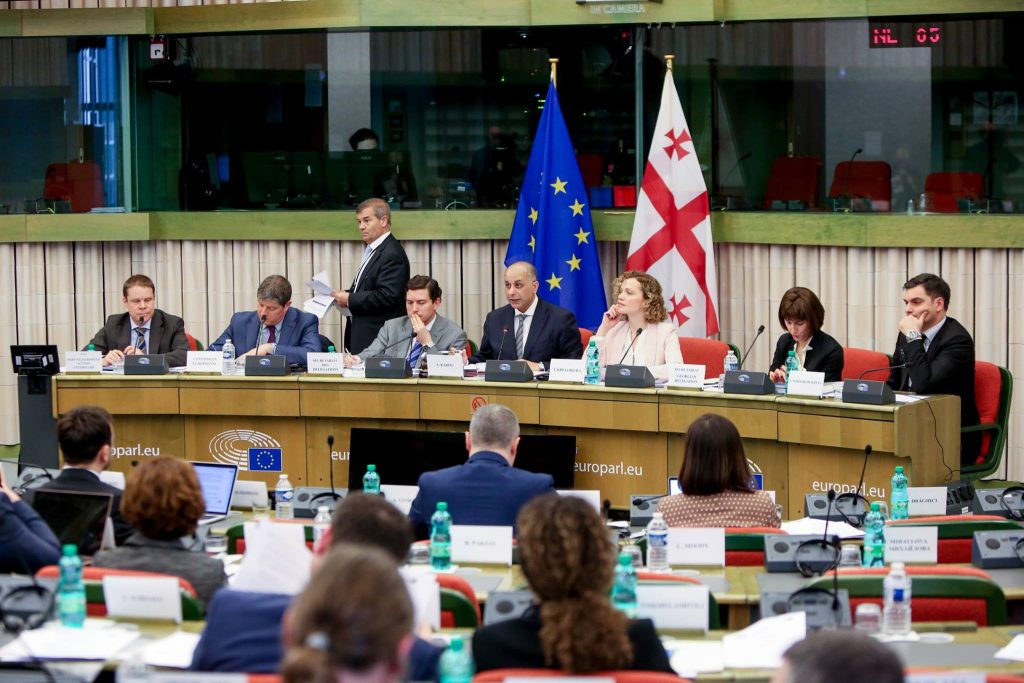Members of the European Parliament and the Parliament of Georgia gathered for the eighth session of the EU-Georgia Parliamentary Association Committee in Strasbourg on March 27-28.
The Association Committee, which provides parliamentary oversight over the implementation of the EU-Georgia Association Agreement, was co-chaired by Tamar Khulordava, chairperson of the Parliamentary European integration committee, and Sajjad Karim, MEP from the United Kingdom.
On March 28, the Committee adopted a joint statement, endorsed by three votes from the European Parliament (zero against and zero abstentions) and seven votes from the Georgian side (zero against and two abstentions).
In their joint statement, the lawmakers welcomed “the continuous deepening of EU-Georgia relations,” expressed their “unwavering support” for Georgia’s European and Euro-Atlantic integration and hailed the country’s “steady progress on this chosen path.” We have summarized the document below.
EU-Georgia Relations
The Association Committee recalled that pursuant to Article 49 of the Treaty on European Union and in line with the Rome Declaration, “any European State may apply to become a member of the European Union, provided that it upholds the Copenhagen criteria.”
It also stressed the visa liberalization “remains the crowning achievement of comprehensive reforms and harmonization efforts” carried out by the Government of Georgia, and welcomed “active efforts” of the Georgian authorities “to prevent impediments to the visa-free regime.”
The Committee also urged the EU Member States to recognize Georgia as a safe country of origin, “as this would speed up the processing of asylum requests in the EU.”
The lawmakers also welcomed the adoption of the EP report on the implementation of the Association Agreement last November. They said “while the overall picture remains positive on harmonization, legislative and administrative steps,” there are “some areas” where further approximation efforts are needed, including in labor law, environment protection, non-discrimination against vulnerable groups and the independence of the judiciary.
The Committee also highlighted Georgia’s “key role as a partner for European energy security,” and its “strategic role in the field of transport and connectivity and increasingly as a transportation and logistics hub in the region.”
The lawmakers also touched upon the country’s 2018 Presidential elections, calling it “an important milestone for Georgia,” marking “the conclusion of the shift to a fully parliamentary system.”
The Committee welcomed the assessment of the international observation mission, that elections were “overall competitive and well administered, that candidates were able to campaign freely and that voters had a genuine choice,” but expressed concerns over “instances of misuse of administrative resources, undue pressure on voters and intimidation, and sporadic violent incidents which have been pinpointed by the international observers, and by the high level of polarization of the public and of media, negative campaigning and verbal attacks on civil society.”
The statement referred to the judiciary as well, calling on the Georgian authorities “to consolidate the reforms carried out so far and to complete and implement the 4th wave of the justice reform.”
The lawmakers also noted that the pending process of lifetime appointment of judges should be carried out “on the basis of clear and objective criteria and through a competitive process developed through meaningful dialogue with the civil society and main political forces.”
Concluded ???? Parliamentary Association Committee at @Europarl_EN. Noted ?? progress on AA implementation, improvement in trade with ??, increased Parliamentary oversight and expressed steadfast support to ??sovereignty and territorial integrity.Thanks to @SHKMEP @ClareMoodyMEP pic.twitter.com/WjTaagFWxV
— Tamar Khulordava (@TamarKhulordava) March 28, 2019
Abkhazia, Tskhinvali regions
The Association Committee reiterated its “unwavering support for the independence, sovereignty and territorial integrity of Georgia,” and condemned “the ongoing illegal occupation and rampant steps towards the factual annexation of the Georgian regions of Abkhazia and Tskhinvali region/South Ossetia by the Russian Federation.”
It also condemned deteriorated human rights and security situation in Abkhazia and Tskhinvali regions, noting that the Kremlin’s “destabilization tactics” in Georgia threaten “peace and security in entire Europe.”
“Russia’s illegal steps undermine the efforts of the EU and Georgia towards peaceful conflict resolution, further divides communities that once lived in harmony, and exacerbates the already dire socio-economic conditions of the local population on both sides of the occupation line,” reads the statement.
The lawmakers also condemned the murder of Georgian citizens – Archil Tatunashvili, Davit Basharuli and Giga Otkhozoria, and expressed “particular concern” over the recent death of Irakli Kvaratskhelia at a Russian military base in Abkhazia.
The Committee also expressed its support to Georgia’s “pursuit of a peaceful conflict resolution policy,“ and welcomed the country’s “steady and resolute endeavors to maintain any possible forms of dialogue and outreach towards the populations of the occupied regions of Abkhazia and Tskhinvali region/South Ossetia.”
This post is also available in: ქართული (Georgian) Русский (Russian)

